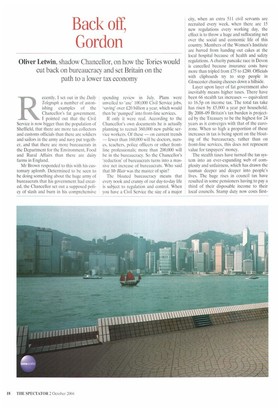Back off, Gordon
Oliver Letwin, shadow Chancellor, on how the Tories would cut back on bureaucracy and set Britain on the path to a lower tax economy
Recently, I set out in the Daily Telegraph a number of astonishing examples of the Chancellor's fat government. I pointed out that the Civil Service is now bigger than the population of Sheffield, that there are more tax collectors and customs officials than there are soldiers and sailors in the army and navy put together, and that there are more bureaucrats in the Department for the Environment, Food and Rural Affairs than there are dairy farms in England.
Mr Brown responded to this with his customary aplomb. Determined to be seen to be doing something about the huge army of bureaucrats that his government had created, the Chancellor set out a supposed policy of slash and burn in his comprehensive spending review in July. Plans were unveiled to 'axe' 100,000 Civil Service jobs, 'saving' over £20 billion a year, which would then be 'pumped' into front-line services.
If only it were real. According to the Chancellor's own documents he is actually planning to recruit 360,000 new public service workers. Of these — on current trends — fewer than 160,000 will be doctors, nurses, teachers, police officers or other frontline professionals; more than 200,000 will be in the bureaucracy. So the Chancellor's 'reduction' of bureaucrats turns into a massive net increase of bureaucrats. Who said that Mr Blair was the master of spin?
The bloated bureaucracy means that every nook and cranny of our day-to-day life is subject to regulation and control. When you have a Civil Service the size of a major city, when an extra 511 civil servants are recruited every week, when there are 15 new regulations every working day, the effect is to throw a huge and suffocating net over the social and economic life of this country. Members of the Women's Institute are barred from handing out cakes at the local hospital because of health and safety regulations. A charity pancake race in Devon is cancelled because insurance costs have more than tripled from £75 to £280. Officials with clipboards try to stop people in Gloucester chasing cheeses down a hillside.
Layer upon layer of fat government also inevitably means higher taxes. There have been 66 stealth tax increases — equivalent to 16.5p on income tax. The total tax take has risen by £5,000 a year per household. By 2008-09 Britain's tax burden is projected by the Treasury to be the highest for 24 years as it converges with that of the eurozone. When so high a proportion of these increases in tax is being spent on the bloating of the bureaucracy, rather than on front-line services, this does not represent value for taxpayers' money.
The stealth taxes have turned the tax system into an ever-expanding web of complexity and unfairness, which has drawn the taxman deeper and deeper into people's lives. The huge rises in council tax have resulted in some pensioners having to pay a third of their disposable income to their local councils. Stamp duty now costs first time buyers 11,000 on a £60,000 house, and death duties are now being paid by people inheriting former council houses.
Nor are these tax increases enough to feed the bloated bureaucracy. The Chancellor's finances have moved from surplus to structural deficit, making it a certainty that a third-term Labour government will mean third-term tax rises.
The combination of higher tax burdens and higher regulatory burdens has had dramatic effects on our economic competitiveness. We have slipped from 4th to 15th in the world competitiveness league. Every other major developed English-speaking economy is growing faster than ours. We have been outpaced by Australia, Canada, New Zealand and the US. Ireland, which has cut bureaucracy, kept public spending under control and reduced tax burdens, has had twice our rate of economic growth over the last seven years, and now has a higher income per head than we do.
How can we deal with these problems? The answer is straightforward. By slimming down fat government, by cutting back on the bureaucracy, we can get the money to the frontline, where it belongs, and give taxpayers value for money. That, in turn, will enable us to fund front-line public services properly within spending controls tight enough to avoid Mr Brown's thirdterm tax rises. By putting government on a diet, we can set Britain on the path to a lower tax economy and a simpler and fairer tax system.
But slimming down the fat bureaucracy has another purpose. It is one of the indispensable preconditions for getting the state off people's backs. Fewer bureaucrats mean fewer regulations, less interference. In schools and hospitals it means getting directives and administrators off the backs of teachers, doctors and nurses. In policing, it means getting standards units and targets off the backs of constables and chief constables. In business, it means getting inspectors and interferers off the backs of entrepreneurs.
It is important to recognise that this attack on fat government is not an attack on the nation's public servants. It is an assault on their political masters, who have allowed government to become overbearing and underperforming.
There is much that the government has to do in order to protect our freedoms and to provide security. And we have some of the finest public servants in the world to do it. The challenge is to identify what they alone can do and to distinguish this from what they either cannot do, or do not need to do, or positively should not do.
In this way, the diet for government can be a health cure rather than a starvation programme. The body politic is like the human body. When it is lean and fit, it is more — not less — able to do what we ask of it.



















































































 Previous page
Previous page